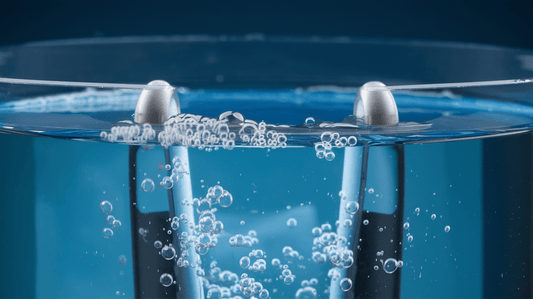Hydrogen Hype: A Humorous Look at Science
UpdatedOur Commitment to Accuracy and Objectivity
Ocemida is committed to delivering reliable and unbiased information. Our editorial team, comprised of experienced editors and medical experts, meticulously reviews every article and guide to ensure the content is accurate, up-to-date, and free from bias.
Rigorous Fact-Checking Process
To uphold the highest standards of accuracy, we adhere to the following fact-checking guidelines:
Trusted Sources: We only cite reputable sources, such as peer-reviewed journals, government reports, academic and medical associations, and interviews with credentialed healthcare professionals.
Evidence-Based: All claims and data are supported by at least one credible source. Each article includes a comprehensive bibliography with full citations and links to the original sources.
Internal Linking: While we may include internal links to other relevant Ocemida pages for better navigation, these links are never used as primary sources for scientific information.
Expert Review: A member of our medical or scientific expert team provides a final review of the content and cited sources for all articles and product reviews related to medical and health topics.
By following these rigorous standards, Ocemida strives to provide readers with reliable and informative content.
Share with a friend
So, you've heard of hydrogen water, and you're scratching your head, right? I mean, come on, isn't water already H2O? How much more hydrogen can you stuff into it? It sounds like another marketing gimmick, just like that time they sold us fat-free oil, sugar-free sugar, and that magical unicorn dust that promised to make us look ten years younger. Well, hold on to your hats, folks, because you're in for an eye-opening, myth-busting journey.
The Hydrogen Hiccup
Let's address the elephant in the room first: Yes, water is H2O. But here's the twist: hydrogen water isn't about adding more hydrogen atoms to the water molecule. It's about infusing water with hydrogen gas (H2). Think of it like adding bubbles to soda, except these bubbles are smaller, healthier, and won't make you burp in the middle of a job interview.
It's like when you buy a car. It comes with an engine (because, well, it wouldn't be much of a car without one). But then you can add premium gasoline to make it run smoother and faster. Similarly, water (H2O) is already great, but when you add extra hydrogen gas (H2), you get a premium beverage that might offer some extra health benefits.
The Science Behind the Sip
Now, I know what you're thinking: "Great metaphor, but where's the proof?" Well, let me introduce you to Exhibit A: the world of scientific research. There are numerous studies showing potential benefits of hydrogen water.
In one study, they zapped some poor mice with ionizing radiation (no mice were harmed, they signed consent forms) and then treated them with hydrogen water. Guess what? The hydrogen water significantly reduced the DNA damage in those mice (3). It's like having a personal bodyguard against harmful rays.
The Oxidative Stress Standoff
Another common objection is, "Isn't this just another way to sell me overpriced water?" To answer that, let's go back to our car metaphor. You can drive a car with just any oil, but if you use high-quality synthetic oil, it might improve the car's performance and longevity.
So, back to hydrogen water. Studies suggest that the hydrogen gas infused into the water acts as a powerful antioxidant, neutralizing pesky free radicals that cause oxidative stress (5). It's like having a tiny army of superheroes in your water, battling the villainous free radicals that want to wreak havoc in your body.
The Depression Dilemma and Sleep Scenario
Now, you're probably chuckling and thinking, "So, will this fancy water solve all my life's problems?" Well, not quite, but it might help with a few.
For instance, studies have found that hydrogen water may help combat depression and improve sleep quality (7,8,9). No, it's not a magic potion, but it might just give you that little boost you need. Imagine the hydrogen as a group of tiny therapists and sleep fairies, all working hard to help improve your mood and rest.
The Bottom Line
In the end, it's easy to be skeptical about hydrogen water. After all, it seems counterintuitive to add hydrogen to something that already has hydrogen in it. But once you delve into the science and understand the concept, it's not so far-fetched.
So, is hydrogen water a cure-all miracle? No. Is it a marketing scam? The research suggests otherwise. Is it worth a try? Definitely. After all, who wouldn't want a personal bodyguard against radiation, an army of antioxidant superheroes, and a team of mini therapists and sleep fairies in their water?
Remember, my friends, staying hydrated is essential, but with hydrogen water, you can take it one step further. It's not just about quenching your thirst; it's about adding a little extra oomph to every sip. So, the next time someone tells you that hydrogen water is just a fad, you can confidently tell them, "No, it's science, baby!"
References :
- https://www.ncbi.nlm.nih.gov/pmc/articles/PMC6470902/
- https://pubmed.ncbi.nlm.nih.gov/24965925/
- https://www.ncbi.nlm.nih.gov/pmc/articles/PMC3660246/
- https://www.ncbi.nlm.nih.gov/pmc/articles/PMC5549438/
- https://pubmed.ncbi.nlm.nih.gov/30641883/
- https://www.ncbi.nlm.nih.gov/pmc/articles/PMC5518675/
- https://www.ncbi.nlm.nih.gov/pmc/articles/PMC5584302/
Table of Contents









































